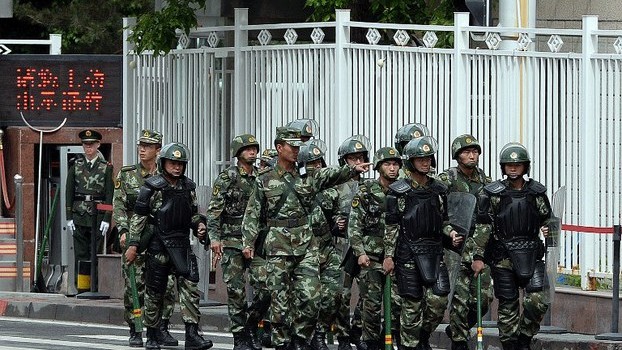Four people, including a police officer, have been killed and several others wounded in fresh violence in China’s troubled Xinjiang region, where nearly a dozen ethnic minority Uyghurs received the death penalty Thursday on terrorism-related charges, according to officials and residents.
The killings occurred in two incidents in Toksu (in Chinese, Xinhe) county in Xinjiang’s Aksu perfecture on May 29, a week after Chinese authorities launched a year-long campaign against terrorism following a deadly attack at a market place in the regional capital Urumqi which left 39 people dead.
In one incident, a police officer and two Uyghur men were killed during a raid on a hideout of “separatists” at Karatagh village in midwestern Xinjiang, home to the mostly Muslim Uyghurs who complain of heavy-handed rule, including curbs on Islamic practices, the village chief said.
In the other case in the same area, a Uyghur man was shot dead over an argument with government enforcement officials after they forced his wife to show her face partly covered by a headscarf, village chief Arup Siyit told RFA’s Uyghur Service.
State security officials in the county said that the police officer was stabbed to death when an eight-man police party raided a house in search of two bomb-making suspects following the discovery of explosives.
“Our investigation team which consisted of eight police officers was attacked by the suspects with knives and sticks,” said Turjan Turghun, an officer of the county state security team.
“Police responded with gunfire, killing the key suspect Imin Tomur, 35, and his brother Rahman Tomur, 37, on the spot and wounding his friend Yasin Osman, 35.”
Accomplice
Tursun Kurban, the head of the security team, said that Rahman Tomur was not related to the bomb-making case but was shot dead because he was an accomplice of the key suspect.
The officials identified the dead police officer as Xi Li, a Han Chinese. Four other police personnel were injured in the raid.
In the other incident, police opened fire after family members of a woman who was forced to remove her headscarf attacked them with sticks, a resident of Karatash village said.
“I heard that the husband was [shot] dead, I don’t know how many were injured,” the resident told RFA. “They tried to take off her scarf but she did not agree to it, triggering the attack by her family, including her husband and brother-in-laws.”
Village chief Siyit said two others were injured in the incident, which occurred when officials were conducting a house-to-house check accompanied by police.
Many Uyghurs say headscarves are a marker of Uyghur rather than Muslim identity. Chinese authorities, however, discourage the wearing of headscarves, veils, and other Islamic dress in the region.
Death penalty
Chinese state media reported Thursday that the authorities in ethnically divided Xinjiang have sentenced 81 people on terror-related charges — nine of them to death — and made 29 new arrests in a crackdown that followed the May 22 Urumqi attack.
In addition to the nine given the death penalty, three others received the death penalty with a two-year reprieve, Xinhua news agency reported. The names of the suspects who were cited indicated they were Uyghurs.
Authorities in Xinjiang last week sentenced 55 people for offenses including terrorism at a mass sentencing in a stadium attended by about 7,000 people, state media reported. Hundreds of others are reported to have been detained in recent weeks.
Rights groups have expressed concern over the trials of the terror suspects, considering the common use of forced confessions in the Chinese legal system.
“Lack of justice and legal procedure will lead to more people losing their freedom for political reasons,” Dilxat Raxit, a spokesman for the exiled World Uyghur Congress, said in a statement, according to Agence France-Presse.
Uyghurs in Xinjiang complain they are being marginalized by an influx of Han Chinese, the dominant ethnic group in China, and that they are subjected to discriminatory and often violent checks and searches and restrictive religious and cultural policies, and face a lack of economic opportunity.

Leave a Reply